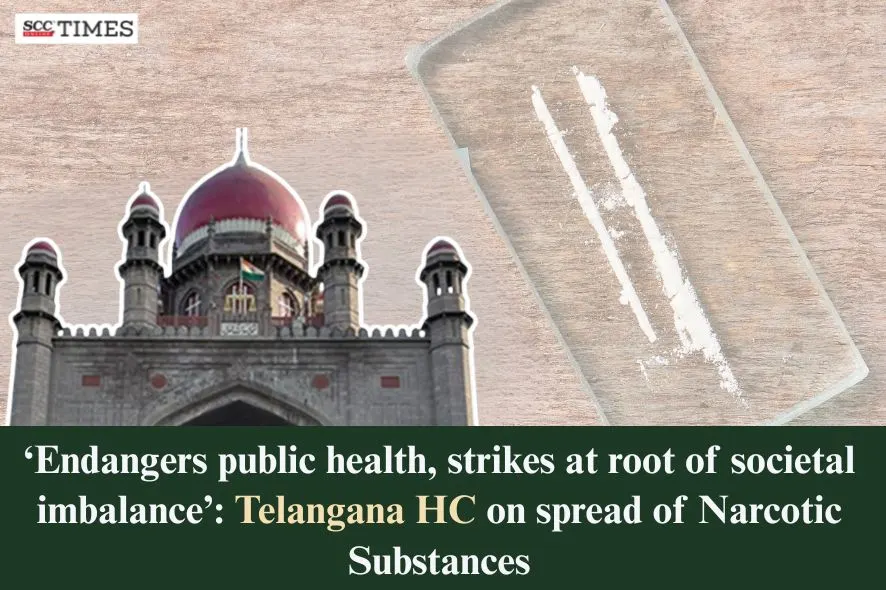Telangana High Court: In a petition seeking the writ of Habeas Corpus for declaring that the order dated 10-3-2025 and consequential orders (‘impugned orders’) detaining the detenu were illegal and ought to be set aside, the Division Bench of Moushumi Bhattacharya, Gadi Praveen Kumar*, JJ, held that any narcotic activity endangering public health and safety, strikes at the very root of societal stability.
Accordingly, the Court declined to interfere with the impugned orders and dismissed the petition.
Background
In the case at hand, the detenu was detained under Section 3 (2) of the Telangana Prevention of Dangerous Activities of Bootleggers, Dacoits, Drug-Offenders, Goondas, Immoral Traffic Offenders, Land Grabbers, Spurious Seed Offenders, Insecticides Offenders, Fertilizer Offenders, Food Adulteration Offenders, Fake Document Offenders, Scheduled Commodities Offenders, Forest Offenders, Gaming Offenders, Sexual Offenders, Explosive Substances Offenders, Arms Offenders, Cyber Crime Offenders and White Collar or Financial Offenders Act, 1986 (‘the Act’).
She had been detained for three different crimes, all pertaining to peddling ganja, a narcotic drug, in the limits of Hyderabad and had therefore been classified as a drug offender under Section 2(f) of the Act.
In the present petition filed by the detenu’s daughter, it was submitted that a preventive detention order takes away the liberty of an individual, leaving her with no recourse and is therefore invoked only when her activities are affecting the public order. The petitioner had further averred that since no final verdict had been passed in the cases registered against the detenu, she ought to be treated as innocent until proven guilty and her actions could not be categorised as a threat to maintenance of public order. The petitioner had also stated contended that the detenu is a 48-year-old housewife whose future would be ruined if such a drastic measure was taken against her.
Per contra, the State had averred that during the period of 2016-2023, the detenu had been released on bail but had still not mended her habitual nature peddling ganja. The State had further contended that the detenu was a drug offender under Section 2(a) of the Act, and keeping in mind the ill-effects of ganja on the public health and particularly the youth and students, the activities of the detenu were considered prejudicial to the maintenance of public order. The State had submitted that while out on bail, the detenu had been increasing her business of selling ganja and the impugned orders had been passed to prevent the detenu from further committing any serious crimes.
Analysis, Law and Decision
The Court noted that Section 2(a) of the Act provides that ‘public order’ shall be deemed to have been adversely affected or is likely to be adversely affected, if any of the activities of any of the persons classified as offenders, directly or indirectly cause or are calculated to cause any harm, danger or alarm or a feeling of insecurity among the general public or any section thereof or a grave widespread danger to life or public health. The Court further noted that the repeated involvement of the detenu in sale and distribution of ganja adversely affected the public order, particularly in respect to the downtrodden and youth of the society.
The Court also stated that the primary objective of preventive detention is not to punish a person for having done something but to intercept the person before the commission of an offence. The Court opined that in the instant case, the repeated and well-planned actions of the detenu were sufficient to raise the presumption of threat and harm among the general public regarding their health, which is the primary criteria for maintaining peace, law and order in the society.
The Court further stated that, “Public health and safety form an essential part of the constitutional vision under Articles 21 and 47 of the Constitution of India. The wealth of a nation ultimately depends upon the health and well-being of its citizens.” and opined that any activity that endangers public health and safety, particularly through the spread of narcotic substances, strikes at the very root of societal stability.
While pointing out the impact of a parent’s illegal activities on the welfare of the family, the Court granted the detenu an opportunity to reform herself, morally and socially, during the period of preventive detention.
Thus, the Court declined to interfere with the impugned orders for detention and dismissed the petition.
[Roshni Devi v. State of Telangana, 2025 SCC OnLine TS 1469, decided on 28-10-2025]
Judgement authored by: Justice Gadi Praveen Kumar
Advocates who appeared in this case:
For the Petitioner: Ch. Ravinder, Advocate
For the Respondent: Swaroop Oorilla, Advocate



